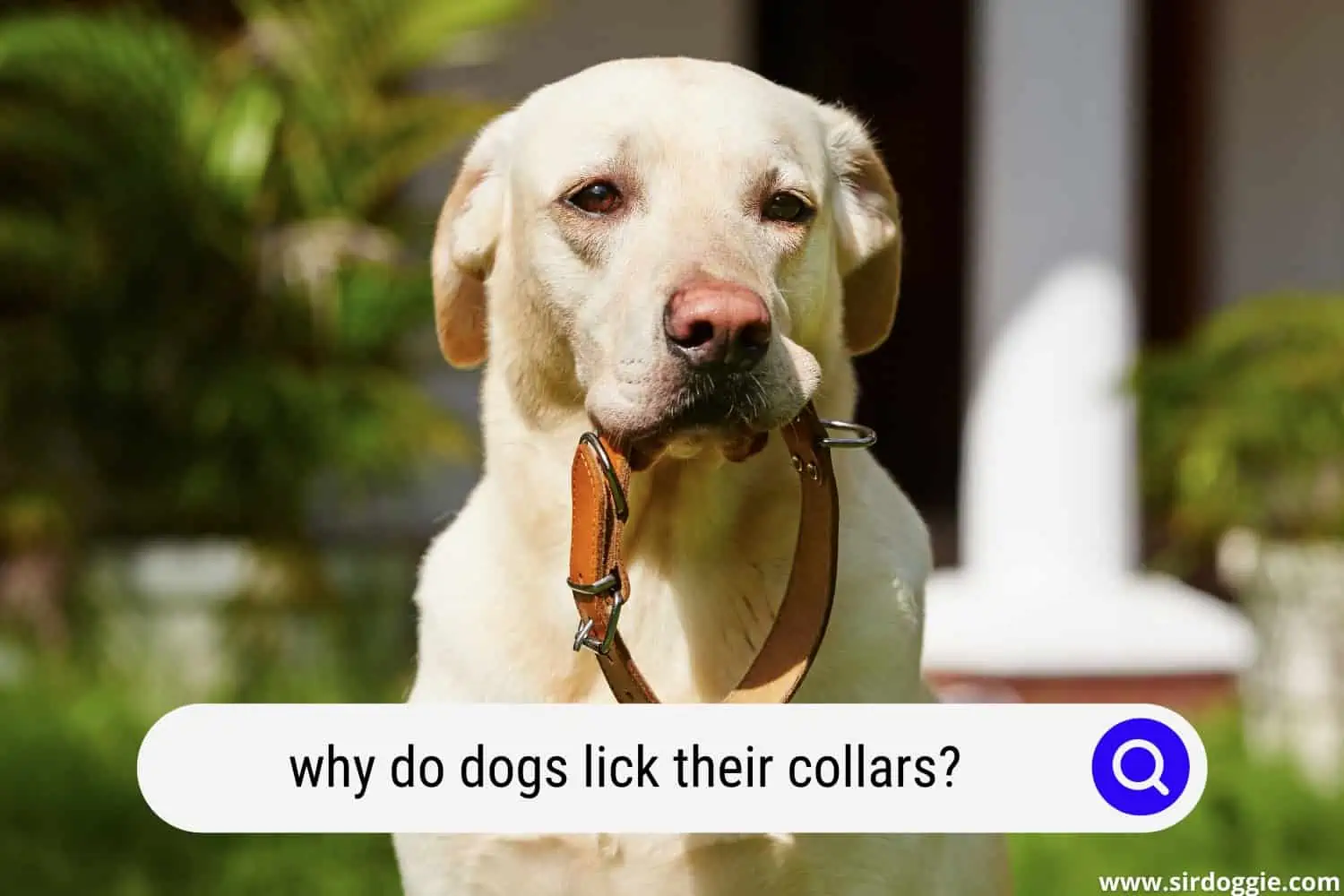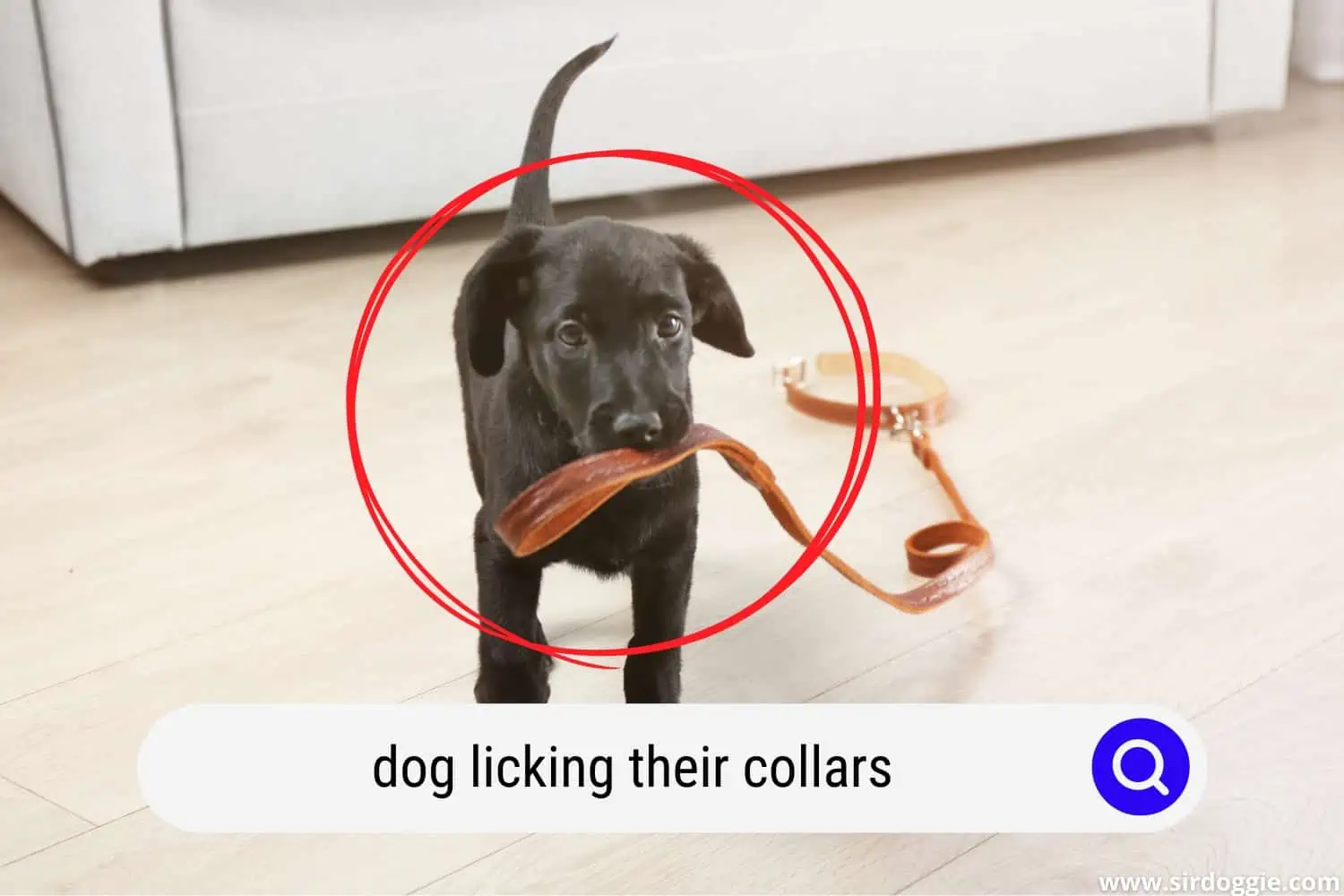Why Do Dogs Lick their Collars? [5 reasons]
Our understanding is that when a dog licks our face, it is their way of offering us kisses. It’s such a ubiquitous sensation that dog owners simply regard it as a sign of devotion. But along with our faces, dog licks many other things too, one of which is their collar.
So, Why do dogs lick their collars?

The main reason for a dog licking its collar is the attachment to it and the fact that their scent is so prominent on it. They consider the collar a belonging of theirs, so when you take it off, they are likely to start licking their collar excitedly in acknowledgment of how they feel about the item.
Other reasons for licking their collars include the dog just being prone to licking in general, them having a preference for licking the specific collar material or possibly having a desirable (to them) flavor, curiosity, and more.
Related Reading: At What Age Can You Use a Prong Collar?
Here are five reasons why a dog might lick its collar:
1. Attachment or the familiar scent
Dogs may be attracted to their collar because it smells so intensely like them. They identify their smell so heavily on the item, and this is often a cause for joy and excitement in a dog. It is also possible that your dog has seen its collar before and is licking it almost in the manner of coming across an old toy or friend—it’s a positive and familiar thing for them to be presented with.
Additionally, if your dog loves his or her collar or is attached to it very dearly—unlike the dogs who dislike collars or simply don’t care either way—then he or she may lick their collar excessively for this reason as well.
2. Liking the collar’s material, flavor, or feel
Dogs sense their environment through their lips and noses. For the same reason that we touch things with our hands, they will occasionally put things in their mouths to check them out. Dogs also like chewing, and the majority of them have a predilection for particular types of chewing materials.
Cloth, leather, and rawhide are all favorites among most dogs. Other dogs find it enjoyable to chew on alternative material options, such as rubber. Your dog may be licking its collar because it appreciates the flavor or texture of the material from which the collar is manufactured.
3. Your canine companion is just prone to licking
Some dogs are more susceptible to licking than others, and this can be due to genetics, learned habits, or even anxiety.
In the case of your dog seemingly always licking everything and being preoccupied with giving doggy kisses, they may be just prone to being a licker in any scenario, so of course your dog would be licking their collar if they’re already licking everything else, too.
If your dog’s behavior is compulsive or extreme, you should take him or her to the veterinarian to rule out any medical conditions, such as anxiety or possible issues that may be even more concerning. Dogs can acquire obsessive and compulsive habits, such as licking, that can impair their ability to enjoy their lives.
If your dog just appears to like licking and is otherwise healthy and unphased by things, this is most likely just a characteristic of its personality.
4. Boredom
Dogs may easily decide to lick their collars if they are bored. Dogs, like people, require physical and emotional stimulation to avoid becoming depressed or bored. If they have access to their collar or harness, they may simply lick it just because it is there.
5. Wanting to get rid of their collar
If your pup dislikes wearing a collar, he or she may be licking the collar in an attempt to remove it. They may also bite the collar after removal if it is too tight and they’ve learned to associate the collar with discomfort.
There are numerous reasons why your dog may not be fond of his collar. A collar is an instrument of constraint as well as a symbol of such. If your dog attempts to chase after another animal it’s deemed prey, its collar (as well as the leash tied to it) will prohibit him or her from being successful. If your dog pulls against their collar regularly, such as when tethered or on walks, they will come to dislike the collar due to the discomfort.
Dogs recall things that have happened in the past. If your dog identifies the collar with happy experiences, such as walks, he or she will be more likely to accept the collar. The likelihood of them trying to remove the collar increases if they associate it with limitation, confinement, or distress.
If your dog’s collar is excessively tight, this is a very common reason for a canine to associate it with discomfort and negative feelings. According to standard practice, two fingers should be able to fit between the collar and the dog’s neck. Of course, the size of human fingers varies greatly; thus, this should only be used as a rough guideline.
When should you take the collar off of your dog?
Unfortunately, accidents can happen, and pets sometimes become separated from their owners. As a result, it’s essential to keep your dog’s collar on at all times, especially when walking him or her on a leash, moving houses, or traveling. However, there are several situations in which it is entirely okay (and even safe) to remove your dog’s collar.
Here are some occasions when you remove their collars:
Bedtime
When it’s time to go to bed, removing your dog’s collar after their last potty break of the day can provide a much-needed breath of fresh air to their fur and skin beneath the collar. If your pup moves around a lot at night, scratches, or shakes his head regularly, removing his collar may also help make the evening more peaceful for the human members of the home.
During rowdy playtimes
When your dog is out playing with other dogs, they may get somewhat rowdy when playing with one another. Allow your pup to enjoy his or her frolic (in a contained and monitored area) without his collar whenever feasible. This will reduce the likelihood that his collar may become entangled in another dog’s collar or limb.
Because every play place is unique, paying attention to the regulations in parks and other dog-friendly settings is essential. In many cases, dog collars are removed during group play, yet some dog parks mandate that your dog wear his collar and identification tags at all times.
When crated
When your dog is in its crate, even the finest collars risk becoming choking hazards if the identification tags were to become entangled in the bars of the crate. Along with that, when your dog scratches its neck, its leg may also become entangled in the collar, which can cause fractures or other leg damage in a confined area such as a crate.

FAQs
Do collars cause discomfort for dogs?
A collar may be associated with maltreatment or agony for your dog, depending on his or her previous experiences. The use of a collar for restraint in any capacity may induce some discomfort around the neck, but most dogs become quickly familiarized with their collars and accept them as a normal part of life. For dogs that may have been mistreated before finding their forever homes though, these dogs may perceive their collar as a weapon for abusing them. Some collars can create anxiety in dogs, but this is often not the case.
Is it necessary to have a collar on my dog at all times?
Some dogs seem to like wearing a collar, but from a practical standpoint, wearing a collar all of the time may sometimes cause damage to their hair and skin on their neck area as the collar usually rubs against their body. Ensuring you have a collar that fits properly and is made of a suitable material will reduce these risks in the majority of cases. Having your dog wear a collar 24/7 may not be the most comfortable scenario, but it allows them to be identified and returned home in the event of them running off or the family experiencing an emergency in which they become separated.
What causes dogs to lick stuff haphazardly?
There are plenty of times when there are just no satisfactory answers for why a dog may be licking something. Often, they’re either bored or curious or even both at the same time.
Most of the time, they lick stuff out of curiosity. Dogs have developed enhanced hearing, smell, and taste sensors to compensate for the lack of tactile sensation in their bodies. They inspect new items by sniffing them and licking them. Have you ever observed that when you get a new toy for your dog, they don’t immediately run off with it? They will turn the toy around in their paws and inspect it until they are confident enough to finally go play with it. The same is true for treats that they are not accustomed to, and this is especially true for fussy eaters.
Secondly, they will also lick things because they are bored. Dogs get bored, and when they’re stuck with nothing to do, they’ll come up with creative methods to keep themselves entertained. For example, dogs that rest or squirm on their backs, chase their tails, or constantly lick their paws for no plausible reason are generally showing signs of boredom.
Is it true that shock collars are harmful to dogs?
Shock collars may certainly be dangerous for your dog. When your dog receives an electric shock, it may experience psychological discomfort, including anxiety and high levels of tension—wouldn’t you feel the same if this was done to you? The shock may also cause an undesirable rise in heart rate as well as severe burns to the skin on his body.
Related Reading: 4 Best Collars For Double Coated Dogs

Family Dog Expert Author
Hi there! I’m Stuart, a devoted dog lover and family dog expert with over a decade of experience working with our furry companions. My passion for dogs drives me to share my knowledge and expertise, helping families build strong, loving bonds with their four-legged friends. When I’m not writing for SirDoggie, you’ll find me hiking, playing with my beautiful dog, or studying music.